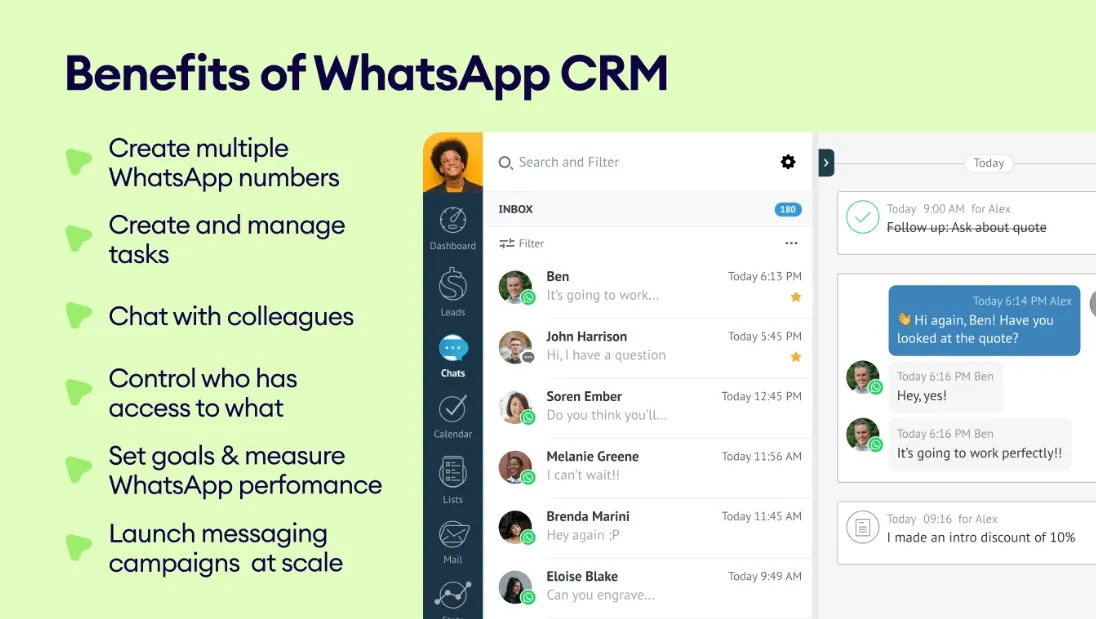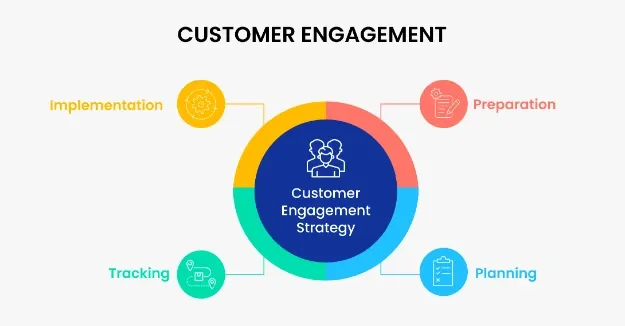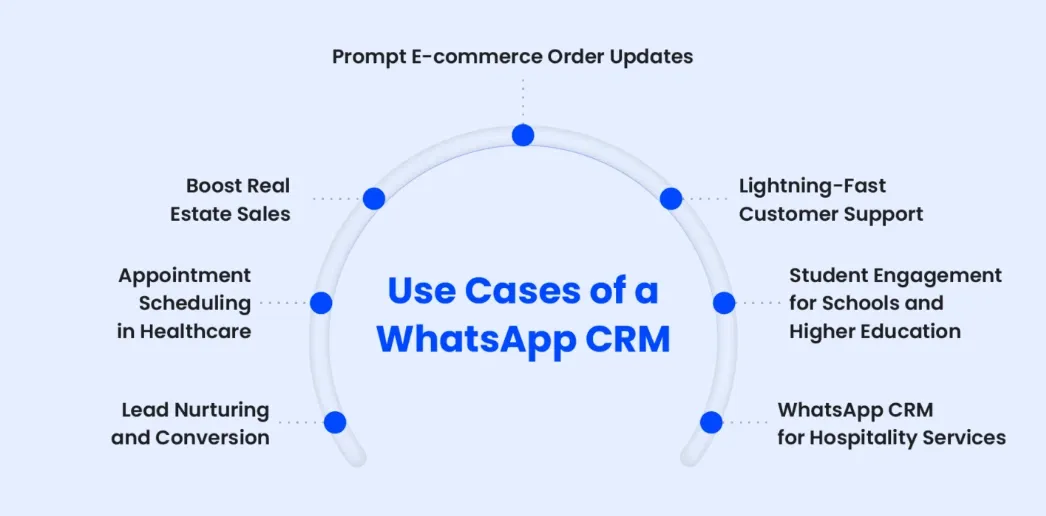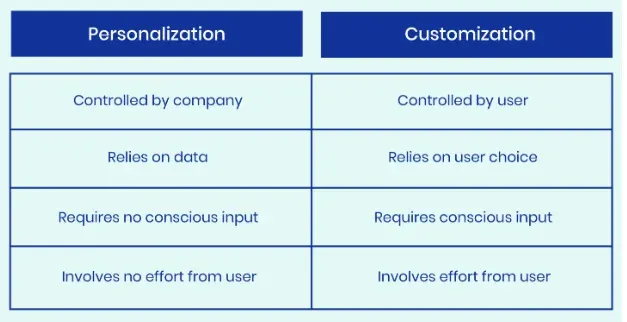Introduction
Did you know that WhatsApp is the most popular messaging app globally, with over 2 billion monthly active users? Harnessing its power for CRM can take your business to new heights.
WhatsApp offers a unique opportunity to chat, connect, and conquer your customers. Integrating WhatsApp into your CRM strategy lets you personalize interactions, provide real-time support, and build lasting relationships. This blog will explore proven strategies to optimize your WhatsApp CRM game.
Join us as we unlock the potential of WhatsApp CRM and equip you with the tools to conquer your customer relationships. Get ready to chat, connect, and conquer the world of CRM with WhatsApp!
What is WhatsApp CRM?
WhatsApp CRM refers to integrating WhatsApp messaging capabilities with a CRM system, such as Zoho CRM. It allows businesses to manage and automate customer interactions, lead generation, and support processes through the WhatsApp platform. By seamlessly combining the power of CRM and the popularity of WhatsApp, businesses can enhance their customer relationships and drive operational efficiency.
Why Should Businesses Use WhatsApp CRM?
WhatsApp CRM packs a ton of benefits for any business. WhatsApp Messages have a 98% open rate & a 45-60% CTR., which is the key indicator of how crucial it is for customer engagement. Let’s take a deeper look at the benefits.

Enhanced Customer Engagement
With WhatsApp CRM, businesses can leverage the rich media capabilities of WhatsApp to create engaging conversations with customers. From sending product images and videos to sharing brochures and price lists, WhatsApp enables businesses to provide a personalized and interactive experience.

Personalized Messaging and Quick Response Times
WhatsApp CRM empowers businesses to send personalized messages to customers, addressing their needs and preferences. The instant nature of WhatsApp ensures quick response times, enabling businesses to provide timely support and build strong customer relationships.
Seamless Communication
WhatsApp CRM enables real-time communication between businesses and customers, eliminating the delays associated with traditional channels such as email or phone calls. Businesses can instantly respond to customer queries, provide updates, and resolve issues, improving customer satisfaction.
Who Should Use WhatsApp CRM?
Although WhatsApp seems an instant solution to your business problems, not all of them need a WhatsApp CRM integration. Here is a list of businesses that should use such a CRM solution:
E-commerce Businesses
For e-commerce businesses, WhatsApp CRM can be a game-changer. Customers can inquire about products, receive updates on their orders, and seek assistance via WhatsApp.
Service-Based Companies
Service-based companies can leverage WhatsApp CRM to provide personalized customer support. From troubleshooting technical issues to offering step-by-step guidance, WhatsApp enables real-time assistance, ensuring prompt issue resolution and enhanced customer satisfaction.
Appointment Scheduling and Reminders through WhatsApp
WhatsApp CRM allows service-based companies to schedule appointments with clients directly through the platform. Automated reminders can be sent to both parties, reducing no-shows and facilitating efficient time management.
Sales and Marketing Teams
Sales and marketing teams can leverage WhatsApp CRM for lead generation. By engaging with potential customers through WhatsApp, businesses can nurture relationships, provide information, and guide prospects through the sales funnel.
When to Implement WhatsApp CRM?
WhatsApp CRM is a powerful tool to enhance customer engagement throughout their journey with your business. Let's explore when it's ideal to implement WhatsApp CRM and how it can benefit your business.
Pre-Purchase Stage:
Use WhatsApp CRM to provide real-time product information and guide customers toward informed purchase decisions.
Post-Purchase Stage:
Automate order tracking updates via WhatsApp CRM to enhance the customer experience.
Gathering Feedback:
Leverage WhatsApp for personalized surveys and gather valuable feedback to improve products and services.
Ongoing Support:
Offer proactive customer support through WhatsApp, promptly addressing queries and building trust.
Troubleshooting:
Resolve issues promptly by integrating WhatsApp CRM, providing real-time support and personalized solutions.
How to Implement WhatsApp CRM Successfully?
Implementing WhatsApp CRM successfully requires careful planning, integration, and training. Let's explore the key steps in implementing WhatsApp CRM to ensure a smooth and effective integration into your customer support strategy.
Building a WhatsApp CRM Strategy:
Clearly define your goals and objectives to tailor your approach and measure the success of your WhatsApp CRM efforts.
Defining Target Audience and Personas:
Understand your target audience and create customer personas to personalize WhatsApp interactions and drive engagement.
Suggested Reading:
11 Expert Tips for Maximizing WhatsApp CRM Effectiveness
Integrating WhatsApp CRM with Existing Systems:
Seamlessly integrate WhatsApp with your CRM software to access customer information and maintain a centralized database.
Automating Processes:
Automate routine tasks like sending updates or welcome messages to save time, reduce errors, and efficiently scale your WhatsApp CRM efforts.
Training and Empowering Customer Support Teams:
Provide comprehensive training to your teams on using WhatsApp features, understanding integrations, and managing customer interactions effectively.
Equipping Teams with Tools and Resources:
Provide templates, FAQs, and knowledge bases to ensure consistent messaging and efficient responses during WhatsApp conversations.
WhatsApp CRM Best Practices
To maximize the potential of WhatsApp CRM, it's important to follow some best practices to help you deliver outstanding customer experiences. Let's explore these best practices:
Privacy and Data Security
As with any customer communication platform, it's vital to prioritize privacy and comply with applicable regulations. Familiarize yourself with data protection laws and implement measures to safeguard customer information. Obtain consent before initiating WhatsApp interactions and educate your teams on privacy guidelines.

Implementing secure data storage and encryption
When integrating WhatsApp with your CRM system, ensure customer data is securely stored and encrypted. This protects sensitive information and builds trust with your customers. Regularly review your security protocols and keep them current to mitigate potential risks.
Personalization and Customization
WhatsApp offers various features that allow you to personalize your interactions. Utilize customer data stored in your CRM system to tailor messages according to individual preferences, previous purchases, or specific customer segments. Personalization makes customers feel valued and enhances their overall experience with your business.

Utilizing WhatsApp's features to create a personalized experience
WhatsApp provides multimedia sharing, voice messages, and emojis that can be leveraged to create a more engaging and personalized experience. Utilize these features thoughtfully to enhance your communication and make it more memorable for your customers.
Conclusion
Incorporating WhatsApp CRM into your customer support strategy can bring numerous benefits, including enhanced engagement, improved customer satisfaction, and streamlined communication. You can build strong customer relationships and gain a competitive edge by implementing WhatsApp CRM at the right customer journey stages and following best practices. Embrace WhatsApp CRM as a valuable tool to connect with your customers and unlock new opportunities for business growth.
Dominate customer relationships with WhatsApp CRM strategies powered by BotPenguin. Chat seamlessly, connect personally, and conquer your goals. Integrate BotPenguin now and elevate your CRM game!
Frequently Asked Questions (FAQs)
What is WhatsApp CRM and why is it important for businesses?
WhatsApp CRM refers to the integration of WhatsApp messaging with customer relationship management (CRM) systems. It allows businesses to communicate with customers, manage interactions, and store relevant data within a centralized CRM platform. WhatsApp CRM is important as it enables businesses to streamline customer communication, enhance engagement, and improve overall customer experience.
How can WhatsApp CRM benefit my business?
WhatsApp CRM offers several benefits for businesses. It allows for faster and more efficient customer communication, leading to enhanced engagement and higher customer satisfaction. It enables businesses to provide personalized customer service, track customer interactions, and gain valuable insights for targeted marketing campaigns. Additionally, WhatsApp CRM can help businesses increase sales and conversions by leveraging personalized messaging and timely promotions.
Can I integrate WhatsApp with my existing CRM software?
Yes, WhatsApp can usually be integrated with existing CRM software. Many CRM platforms offer APIs or third-party integrations that allow for seamless WhatsApp integration. Consult your CRM provider or a developer to ensure compatibility and explore available integration options.
What are some effective WhatsApp CRM strategies?
Some effective WhatsApp CRM strategies include using WhatsApp for lead generation by offering opt-ins and providing valuable content or promotions. Businesses can also utilize WhatsApp for personalized customer service and support, resolving queries or issues in real-time. Additionally, businesses can leverage WhatsApp for targeted marketing campaigns, delivering personalized messages and offers based on customer preferences.
Are there any success stories of businesses using WhatsApp CRM?
Yes, there are several success stories of businesses leveraging WhatsApp CRM. For example, companies in the e-commerce sector have reported increased sales and customer satisfaction by using WhatsApp for order updates, personalized recommendations, and customer support. Service-based businesses have also seen success by utilizing WhatsApp for appointment scheduling, sending reminders, and offering quick customer assistance.
How can I get started with WhatsApp CRM for my business?
To get started with WhatsApp CRM, you need to follow a few steps. First, ensure that your CRM software supports WhatsApp integration or explore third-party solutions. Next, set up a dedicated WhatsApp phone number for business communication. Train your team on using WhatsApp for customer interactions and establish guidelines for response times, tone, and professionalism. Finally, promote your WhatsApp presence to customers, encouraging them to connect with your business through the platform.


